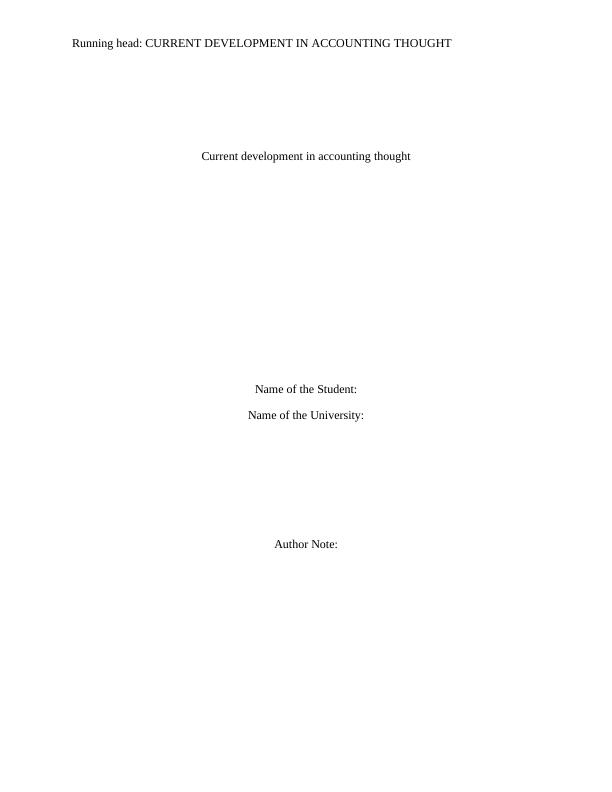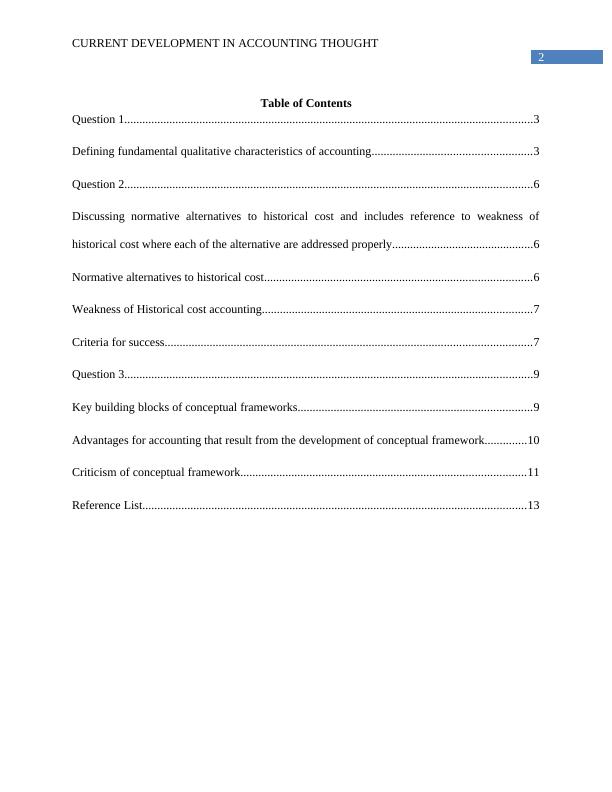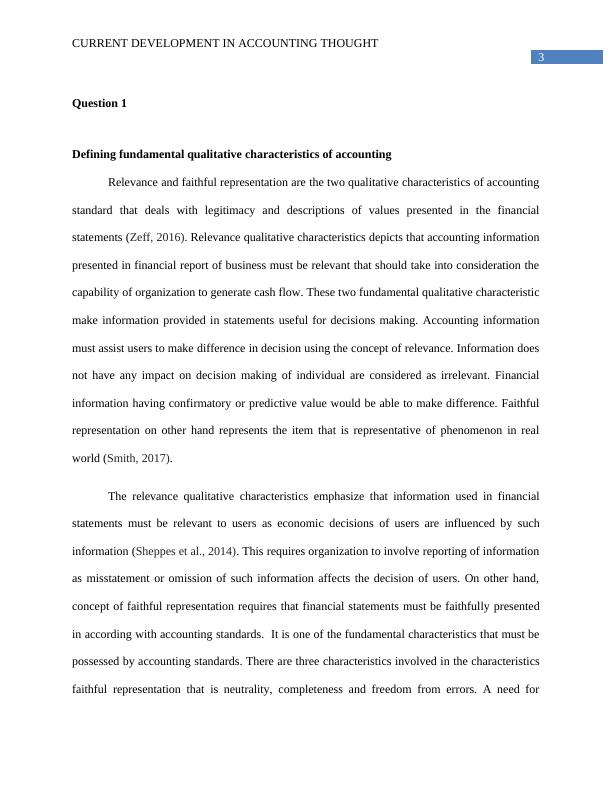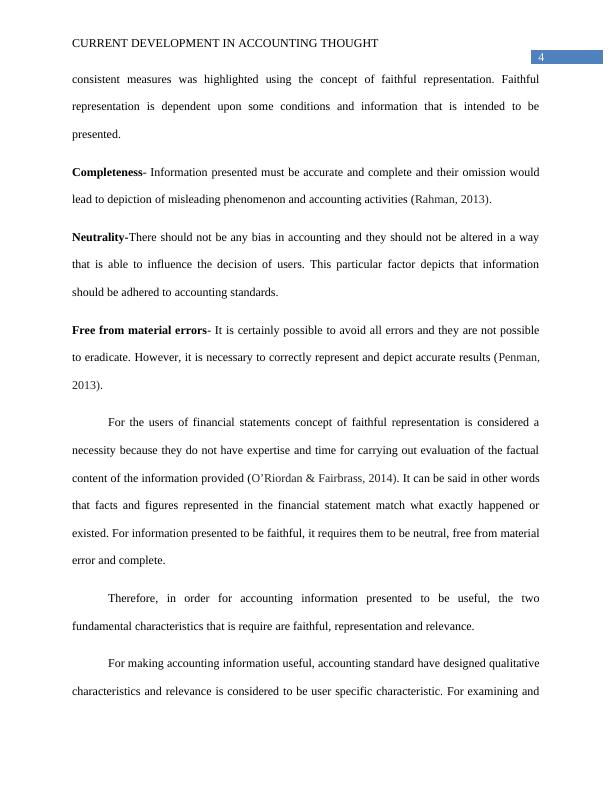Defining fundamental characteristics of accounting
Added on 2020-02-19
15 Pages3179 Words132 Views
Running head: CURRENT DEVELOPMENT IN ACCOUNTING THOUGHTCurrent development in accounting thoughtName of the Student:Name of the University:Author Note:

2CURRENT DEVELOPMENT IN ACCOUNTING THOUGHTTable of ContentsQuestion 1........................................................................................................................................3Defining fundamental qualitative characteristics of accounting.....................................................3Question 2........................................................................................................................................6Discussing normative alternatives to historical cost and includes reference to weakness ofhistorical cost where each of the alternative are addressed properly...............................................6Normative alternatives to historical cost.........................................................................................6Weakness of Historical cost accounting..........................................................................................7Criteria for success..........................................................................................................................7Question 3........................................................................................................................................9Key building blocks of conceptual frameworks..............................................................................9Advantages for accounting that result from the development of conceptual framework..............10Criticism of conceptual framework...............................................................................................11Reference List................................................................................................................................13

3CURRENT DEVELOPMENT IN ACCOUNTING THOUGHTQuestion 1Defining fundamental qualitative characteristics of accountingRelevance and faithful representation are the two qualitative characteristics of accountingstandard that deals with legitimacy and descriptions of values presented in the financialstatements (Zeff, 2016). Relevance qualitative characteristics depicts that accounting informationpresented in financial report of business must be relevant that should take into consideration thecapability of organization to generate cash flow. These two fundamental qualitative characteristicmake information provided in statements useful for decisions making. Accounting informationmust assist users to make difference in decision using the concept of relevance. Information doesnot have any impact on decision making of individual are considered as irrelevant. Financialinformation having confirmatory or predictive value would be able to make difference. Faithfulrepresentation on other hand represents the item that is representative of phenomenon in realworld (Smith, 2017). The relevance qualitative characteristics emphasize that information used in financialstatements must be relevant to users as economic decisions of users are influenced by suchinformation (Sheppes et al., 2014). This requires organization to involve reporting of informationas misstatement or omission of such information affects the decision of users. On other hand,concept of faithful representation requires that financial statements must be faithfully presentedin according with accounting standards. It is one of the fundamental characteristics that must bepossessed by accounting standards. There are three characteristics involved in the characteristicsfaithful representation that is neutrality, completeness and freedom from errors. A need for

4CURRENT DEVELOPMENT IN ACCOUNTING THOUGHTconsistent measures was highlighted using the concept of faithful representation. Faithfulrepresentation is dependent upon some conditions and information that is intended to bepresented. Completeness- Information presented must be accurate and complete and their omission wouldlead to depiction of misleading phenomenon and accounting activities (Rahman, 2013). Neutrality-There should not be any bias in accounting and they should not be altered in a waythat is able to influence the decision of users. This particular factor depicts that informationshould be adhered to accounting standards. Free from material errors- It is certainly possible to avoid all errors and they are not possibleto eradicate. However, it is necessary to correctly represent and depict accurate results (Penman,2013). For the users of financial statements concept of faithful representation is considered anecessity because they do not have expertise and time for carrying out evaluation of the factualcontent of the information provided (O’Riordan & Fairbrass, 2014). It can be said in other wordsthat facts and figures represented in the financial statement match what exactly happened orexisted. For information presented to be faithful, it requires them to be neutral, free from materialerror and complete. Therefore, in order for accounting information presented to be useful, the twofundamental characteristics that is require are faithful, representation and relevance. For making accounting information useful, accounting standard have designed qualitativecharacteristics and relevance is considered to be user specific characteristic. For examining and

End of preview
Want to access all the pages? Upload your documents or become a member.
Related Documents
Accounting Theory Documentlg...
|10
|2933
|93
Concepts and Principles of Financial Reportinglg...
|8
|2482
|138
Conceptual Framework of Accountinglg...
|8
|2342
|325
(PDF) Financial Reporting - Assignment Samplelg...
|6
|1371
|235
Normative Theories in Accounting - Reportlg...
|12
|3313
|49
Financial Reporting - Assignment Samplelg...
|7
|1426
|202